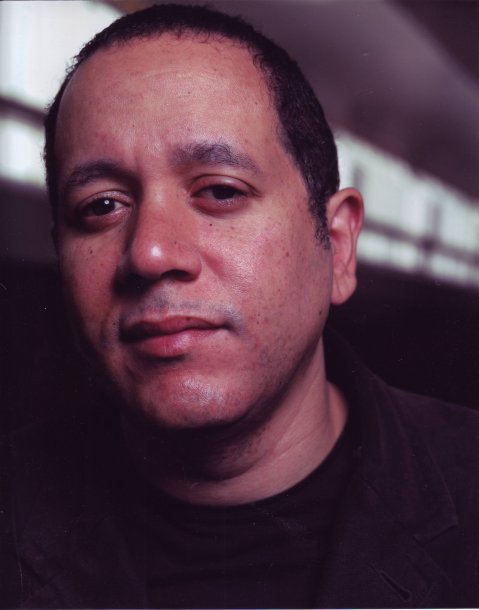José Manuel Prieto em entrevista
Publicado11 Jun 2015
 José Manuel Prieto é doutorado em História pelo Universidad Autónoma de México, foi membro de The New York Public Library's Center for Scholars and Writers e recebeu uma bolsa do Guggenheim e do DAAD (Deutscher Akademischer Austauschdienst) para um programa de residência artística em Berlim. Foi professor convidado no Centro de Investigación y Docencia Económica (CIDE) na Cidade do México e conferencista visitante na Princeton University. É professor associado na Seton Hall University. É autor de várias obras de ficção e não-ficção, entre elas a "trilogia russa", que culmina com o livro Rex. É um dos convidados da sessão "Literatura das Zonas de Contacto Mediterrâneo e América Central", dia 20 de Junho. Entrevistado peo critico literário Carlos Fonseca para o site Assymptote, fala da sua escrita e projectos.
José Manuel Prieto é doutorado em História pelo Universidad Autónoma de México, foi membro de The New York Public Library's Center for Scholars and Writers e recebeu uma bolsa do Guggenheim e do DAAD (Deutscher Akademischer Austauschdienst) para um programa de residência artística em Berlim. Foi professor convidado no Centro de Investigación y Docencia Económica (CIDE) na Cidade do México e conferencista visitante na Princeton University. É professor associado na Seton Hall University. É autor de várias obras de ficção e não-ficção, entre elas a "trilogia russa", que culmina com o livro Rex. É um dos convidados da sessão "Literatura das Zonas de Contacto Mediterrâneo e América Central", dia 20 de Junho. Entrevistado peo critico literário Carlos Fonseca para o site Assymptote, fala da sua escrita e projectos. A entrevista completa, aqui
(...)
One of your big gambles as a Cuban narrator is to narrate from Russia: that is to say, about Russia, from its historical situation and the like. Cuba appears, but always in the margins, a little bit like the protagonists in your novels—somewhat anonymous and vague. At times I feel that this Russia that you imagine—an aristocratic and decadent Russia—is in a way the inverted image of Cuba's desired aim. How would you read this relationship between Russia and Cuba in your novels?
Many people are scandalized by the fact that these three novels aren't about Cuba. There are many novels written out of nostalgia: one travels abroad and reads his country of origin from a distance, at an advantage, so to speak. In my particular case I wasn't interested in doing that. The real reason, apart from aesthetic reasons, was the desire to blur lines, to create a post-national character. It might be a political criticism of the excessive presence of the national, of the notion of Cuban exceptionality. I was 19 when I arrived in Russia, for me a transforming experience, that of landing in another universe, totally distinct, enormous, foreign. And it was an experience of absolute mimesis, of assimilation. The distance disappeared quickly. In the Trilogy novels, from the start I realised that, for the story I wanted to tell it, didn't make more sense to stress whether the narrator was or wasn't Cuban. Nabokov's Humbert Humbert is another kind of foreigner of ambiguous nationality. I believe that Latin American literature has suffered from the certain need to account for the nation, to spell out a certain sense of exceptionality. I, on the contrary, am interested in immersion, or dissolution if you like.
With regard to this, I'm interested in another of your artistic gambles: when many of your contemporaries were narrating a kind of dirty realism from Cuba, associated with the crisis of "The Special Period," you were narrating from Russia—in imaginary terms—a kind of hygienic surrealism which nevertheless had a lot to do with the same historic event: the fall of the Berlin Wall. How do you yourself see this?
More than anything there's an aesthetic difference behind this. I believe that the dirty realist novels are guilty of a certain head-on approach and a wish of testimony, of denouncement, which often remains just that, without much literary scope. Dirt, ugliness—these are the scars of the nation, which should be shown. They end up as vignettes, outlooks, out of which develop certain characteristics of the supposed national reality, in this case Cuban. In a certain sense, they take up the role of the press in other countries. They are a kind of ethnographic literature. That's what I call them: ethnographic novels. In my case, I wasn't interested in this. I looked for the complete opposite: to contribute a certain patina, to blur the present, to accentuate that which is literary and—pompous though it may sound—most transcendent. In a Russian review of Nocturnal Butterflies of the Russian Empire, for example, excessively complimentary, it said that in this novel everything seemed to be narrated from a distance of a thousand years.
My novels, moreover, are located in a post-totalitarian moment. After coming out of the totalitarian collapse, the characters ask themselves: And what do I do now? How do I get out of this? In the first novel in the trilogy, in the Encyclopaedia, my character imagines salvation by means of beauty. In Nocturnal Butterflies of the Russian Empire, the character imagines salvation through money (the search for the rare butterfly, the mythical yazikus). In Rex, the first part repeats the same schema as Nocturnal Butterflies of the Russian Empire: he looks to money—the sale of diamonds—for salvation. But in the second part the character understands that the only possible exit is not in the realm of reality, but in the realm of the symbolic. One has to recover oneself and save one's subjectivity in different ways, through personal reestablishment. To become king—from which the title of Rex comes—is thereby the main undertaking, and it has to do with spiritual rebirth. As you can see, my novels are not direct; they are artefacts of haziness, distance, and analysis.
.
